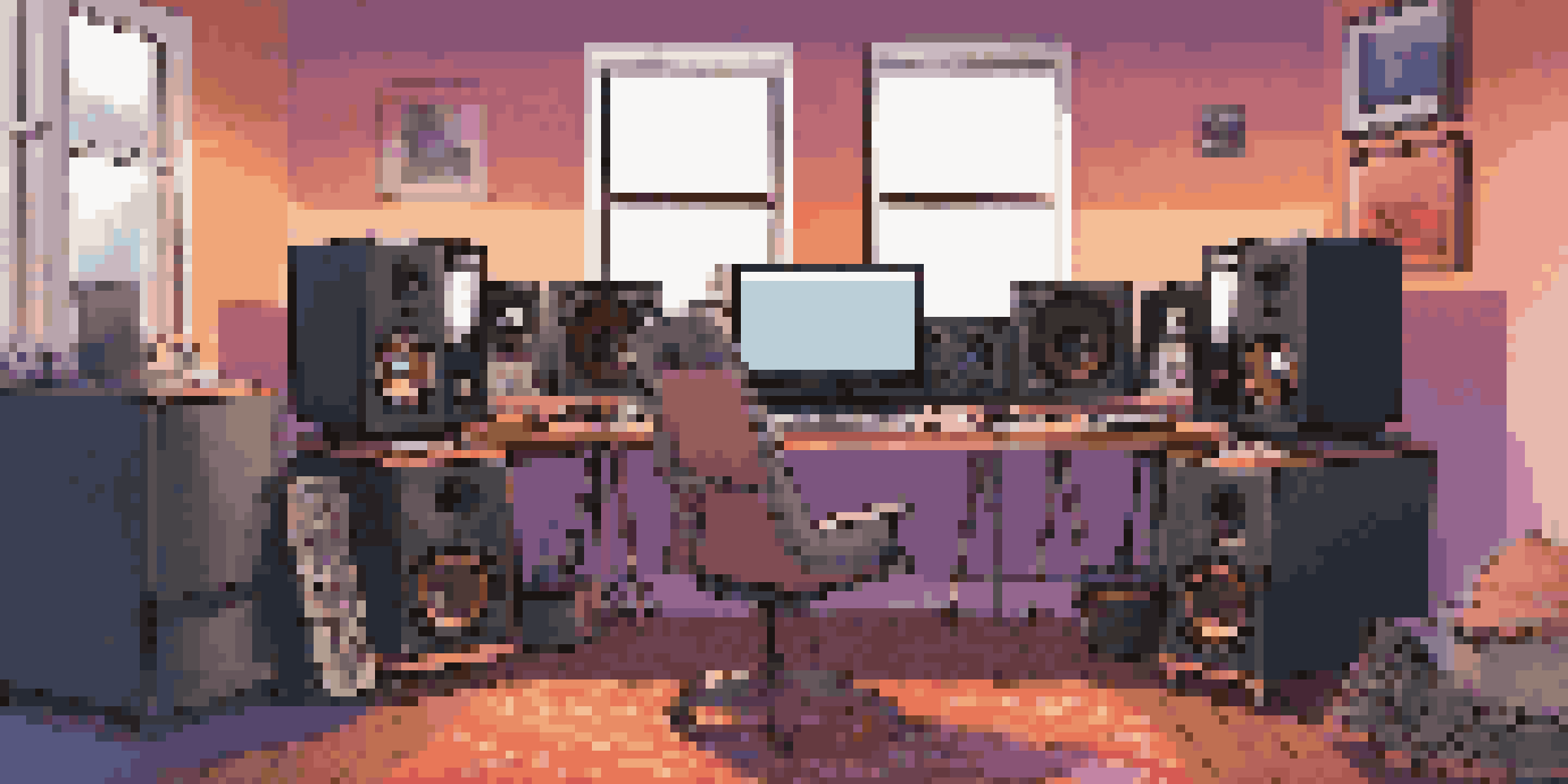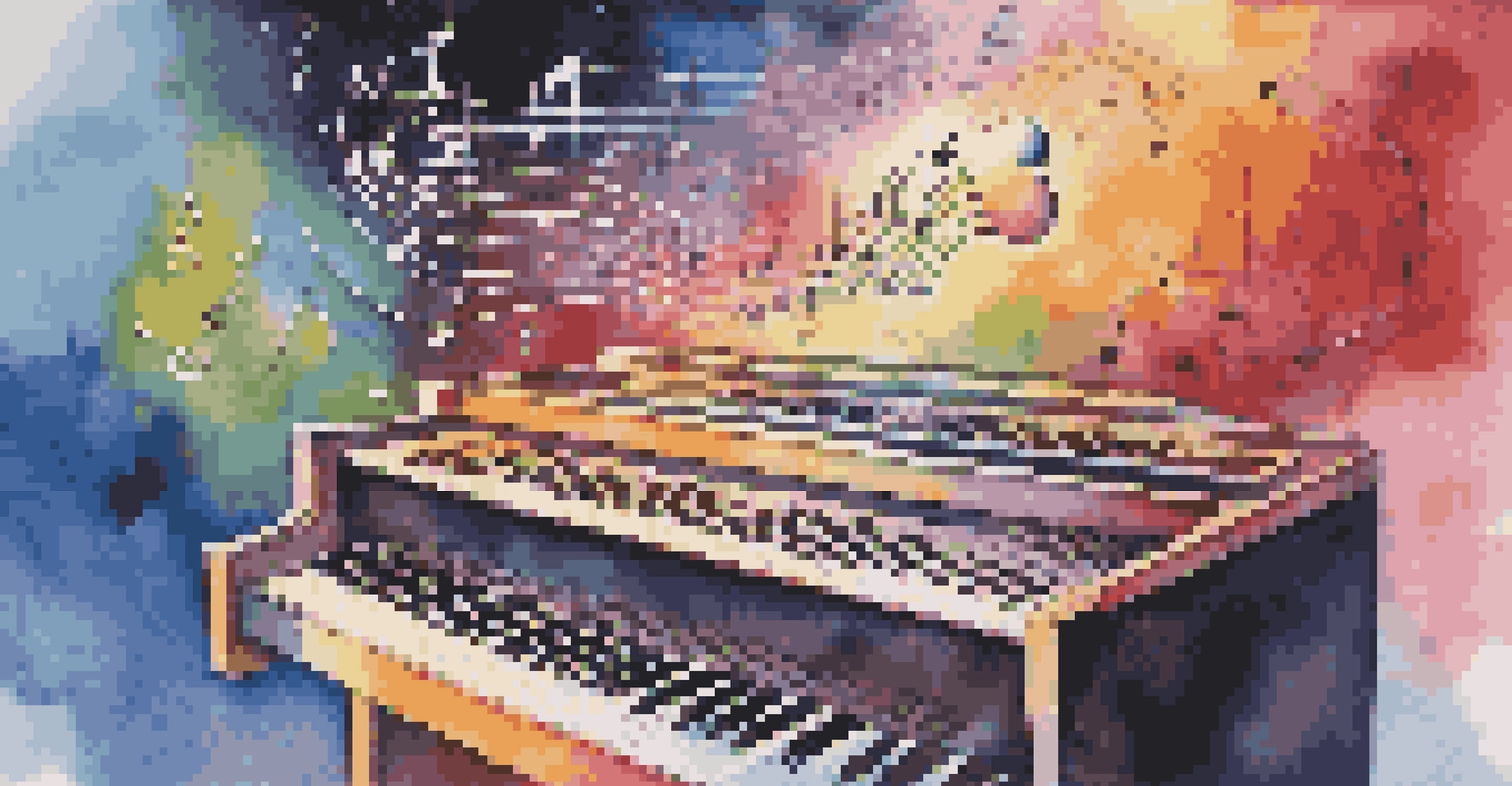The Impact of Technology on Modern Songwriting Techniques

The Evolution of Songwriting Tools in the Digital Age
Songwriting has come a long way from pen and paper, with technology introducing a myriad of tools that make the process more efficient. Digital audio workstations (DAWs) like Ableton Live and Logic Pro have revolutionized how musicians create and edit their work. These platforms not only allow for recording but also offer extensive editing capabilities, enabling songwriters to experiment freely without the constraints of traditional methods.
Technology has fundamentally changed how we create and consume music, giving rise to unprecedented opportunities for artists.
Moreover, the accessibility of these tools means that anyone with a computer can now produce music, democratizing the art of songwriting. This has led to an explosion of new voices in the music scene, as individuals from diverse backgrounds can share their stories through song. The result is a rich tapestry of sounds and styles that reflects a global culture.
As technology continues to evolve, so too do the tools available to songwriters, fostering creativity in ways we couldn’t have imagined just a few decades ago. This shift not only enhances individual expression but also challenges the norms of what a song can be, pushing the boundaries of genre and style.
Collaborative Songwriting in the Age of Connectivity
Collaboration has always been a key element of songwriting, but technology has taken it to new heights. With platforms like Splice and Soundtrap, songwriters can connect and create together from different corners of the world, breaking down geographical barriers. This level of collaboration opens up a world of possibilities, allowing for the fusion of different musical styles and ideas.

In addition, tools like Google Docs enable real-time lyric sharing and editing, making it easier for co-writers to brainstorm and refine their work. This instant feedback loop can lead to more dynamic songwriting sessions, as ideas can be tweaked and developed on the fly. The result? A more polished and innovative final product.
Tech Revolutionizes Songwriting
Advancements in digital tools and AI have transformed the songwriting process, making it more accessible and collaborative.
The ease of collaboration also encourages a sense of community among songwriters, who can learn from one another and share resources. This interconnectedness fosters a culture of support and creativity, where artists can grow together rather than working in isolation.
Influence of Artificial Intelligence on Songwriting
Artificial intelligence (AI) is rapidly changing the landscape of songwriting, offering tools that can generate melodies and lyrics based on user input. Programs like OpenAI's MuseNet can compose music in various styles, providing songwriters with inspiration or a starting point for their creations. This technology raises interesting questions about the role of human creativity in the songwriting process.
The future of music is not about technology; it's about how it enhances the human experience of music-making.
While some may view AI as a threat to traditional songwriting, others see it as a valuable tool that can enhance creativity. For example, a songwriter might use AI-generated ideas to spark their own creativity, blending machine-generated content with their unique voice. In this way, AI can serve as a collaborator rather than a competitor.
However, it's essential to consider the implications of relying too heavily on AI in the creative process. Striking a balance between using technology as a tool and maintaining the authenticity of personal expression is crucial for preserving the art of songwriting.
The Role of Social Media in Shaping Songwriting Trends
Social media platforms like TikTok and Instagram have quickly become powerful tools for songwriters, influencing trends and helping artists reach wider audiences. These platforms allow songwriters to share snippets of their work, garnering instant feedback from listeners and fellow musicians. This immediacy can significantly impact the songwriting process, as artists often adjust their work based on audience reaction.
Additionally, viral challenges and trends can inspire songwriters to create music that resonates with current social sentiments. For instance, a catchy hook might become a backdrop for a dance challenge, prompting songwriters to craft songs with that in mind. This interplay between social media and songwriting not only drives creativity but also shapes the music landscape.
Social Media Shapes Music Trends
Platforms like TikTok and Instagram directly influence songwriting trends, enabling artists to engage with audiences and adapt their work.
Moreover, the ability to directly engage with fans fosters a sense of connection and community, as songwriters share their creative journeys. This transparency can humanize the songwriting process, allowing listeners to feel more invested in the music and the artist behind it.
Digital Distribution and Its Impact on Songwriting
The rise of digital distribution platforms like Spotify and Apple Music has transformed how songwriters think about their craft. With music being more easily accessible than ever, songwriters are not only focused on creating great songs but also on how to market them effectively. This shift has led to an increased emphasis on catchy hooks and memorable choruses, as these elements are crucial for standing out in a crowded marketplace.
Additionally, the data provided by these platforms allows songwriters to analyze listener preferences and trends. By understanding which songs perform well, artists can tailor their songwriting to better meet the demands of their audience. This data-driven approach may influence the themes and styles that songwriters choose to explore.
However, while digital distribution offers incredible opportunities, it also comes with challenges, such as the pressure to constantly produce new content. This can lead to burnout among songwriters who feel the need to keep up with the fast-paced nature of the digital music landscape.
Home Studios and the New Era of DIY Songwriting
The concept of a home studio has shifted dramatically in recent years, allowing songwriters to produce high-quality music without the need for expensive studio time. With affordable recording equipment and user-friendly software, many artists are now embracing the DIY approach to songwriting. This newfound accessibility empowers songwriters to explore their sound and experiment freely, fostering a more intimate creative process.
Furthermore, the ability to record at home means that songwriters can work at their own pace, allowing for more reflection and iteration. This flexibility can lead to more authentic and personal songs, as artists have the time to really hone their craft. The home studio environment also encourages spontaneity, where ideas can be captured as they come, rather than being lost in a professional setting.
DIY Studios Empower Songwriters
The rise of home studios allows songwriters to create high-quality music independently, fostering personal expression and creativity.
However, the DIY approach also means that songwriters must wear multiple hats, balancing creative work with the technical aspects of production. While this can be challenging, it also offers a unique opportunity for personal growth and skill development, as artists learn more about the intricacies of music production.
The Future of Songwriting in a Tech-Driven World
As technology continues to advance, the future of songwriting looks both exciting and uncertain. Innovations in virtual reality (VR) and augmented reality (AR) are already beginning to influence how music is created and experienced. Imagine writing a song in a virtual environment where you can manipulate sound and visuals simultaneously—this could redefine the very essence of songwriting.
Additionally, the rise of blockchain technology may change how songwriters share and monetize their work. By creating secure, transparent systems for royalties and ownership, blockchain could empower artists to take control of their music and ensure they are fairly compensated. This shift could encourage more songwriters to pursue their craft without the constraints of traditional industry practices.

Ultimately, the blend of technology and creativity will continue to shape the future of songwriting. As artists navigate this ever-evolving landscape, the key will be to embrace innovation while remaining true to the core of what makes songwriting a deeply human experience.